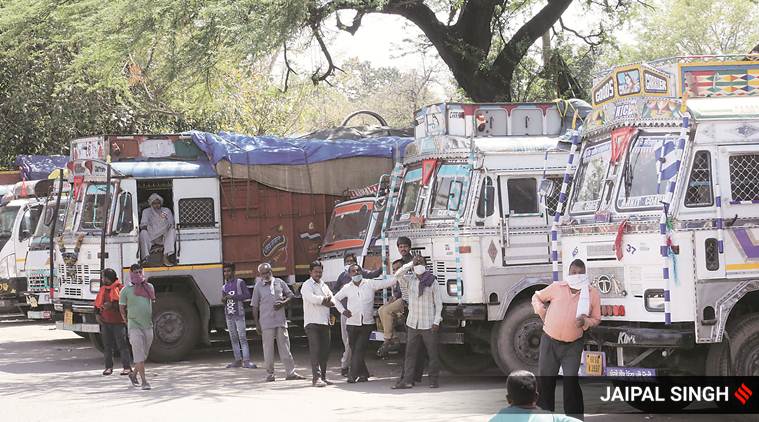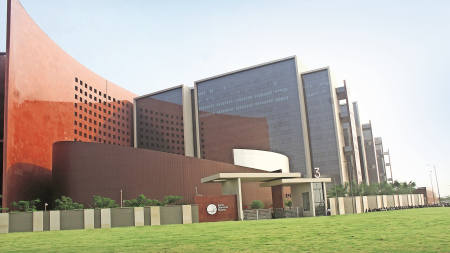- India
- International
Drivers abandon loaded vehicles, trucks stuck as state borders still clogged
Truck owners said almost half the number of drivers fled to their native towns and villages following a pile-up of vehicles at inter-state borders, with some even leaving behind vehicles loaded with goods worth crores of rupees unattended along the highway.
 Trucks lined up in Chandigarh, Monday. (Express photo Jaipal Singh)
Trucks lined up in Chandigarh, Monday. (Express photo Jaipal Singh)
The Centre’s clarification on Sunday allowing movement of all trucks, carrying essential as well as non-essential goods, has not helped unclog choke points across many state borders, with road transporters facing fresh problems caused by the massive reverse migration from economic centres including Delhi and Mumbai to Uttar Pradesh, Bihar and Jharkhand.
Truck owners said almost half the number of drivers fled to their native towns and villages following a pile-up of vehicles at inter-state borders, with some even leaving behind vehicles loaded with goods worth crores of rupees unattended along the highway. Transporters also reported incidents of stranded trucks being looted at locations such as the Maharashtra-Madhya Pradesh border.
Read| Why they walk home
In addition to this, some truckers have reported traffic jams along major routes and highways at the border entry points of states such as Uttar Pradesh, Bihar, Punjab, Maharashtra and West Bengal. “We have received reports of some looting of fruits and vegetables in Maharashtra and goods like rice and flour in some villages of Punjab. We have offered our empty trucks to carry some of these migrants, but there is no clarity from local authorities,” said Kultaran Singh Atwal, President, All India Motor Transport Congress. Truck drivers, doing this suo motu, were facing challans from the local police.
According to official data, most migrant labour from Uttar Pradesh, Bihar, Madhya Pradesh, Punjab and Rajasthan, are in Delhi. “We urge the government to clear the way for trucks carrying essential goods and commodities or else this could lead to a severe shortage of supplies in major centres in the coming days. The government has passed orders but the situation on ground is very different,” Atwal said. “Almost 50 per cent of our truck drivers have ran away to their villages,” he said.
The mass migration of people from major state hubs to their villages has also caused a shortage of labourers in these centres, which has created a problem for truckers and grocery suppliers alike. An owner of a transportation company in Patna reported that two trucks carrying medicines had reached its destination but there was no labour available to unload the vehicles. In places like Delhi-National Capital Region, a glitch in smooth transportation has left some shop owners facing a shortage of essential packaged goods like flour, biscuits, packaged snack foods, etc.

Further, online grocery companies like Bigbasket and Grofers are also far from running at their full capacity. Grofers has, in fact, even reached out to others to augment its workforce. “If your company has idling semi-skilled work force that can do with more income + work in a safe environment, please reach out to Grofers – we are hiring in our warehouses to increase throughout in all cities. Requirement – Smartphone savvy. Transport provided,” Grofers CEO Albinder Dhindsa said in a tweet, adding that one batch of workers from textile industry has already been inducted.
Explained | There’s enough food, but India is struggling to get it to people in COVID-19 lockdown
In a mail to the company’s customers, Grofers’ Head of Customer Experience Suneet Gupta said, “Due to the lockdown, our delivery partners had also gone home for a few days. We are now requesting them to come back with us having taken advanced safety and hygiene precautions for their well-being as well as the safety of our customers. For us to come back to 100% operational capacity will take a few days more”. “.we are running at much lower than our 100% operational capacity as permits are required for all warehouses and passes are required for each delivery person. So far, we have got passes for around 40% of our staff and local authorities are helping us with the rest of the passes,” Gupta added.
Similarly, Bigbasket said the company was operating at 10 per cent capacity on March 25 and as of Sunday at 40 per cent. “Meanwhile, our HR teams have been working on recruiting and retaining people so that we can increase our capacity,” it said in a statement.
Additionally, within the city limits, restaurants and food delivery companies were not receiving items such as cutlery and packaging material, which is necessary for delivery of food, but not seen as essential earlier. “In the case of food, all raw materials for preparation of food were included in the essential category. But then packaging material such as silver foil and plastic cutlery was not in the essential category product list. We had a tough time procuring them,” a delivery-only restaurant-owner based out of Bengaluru said.
Read| No transport and no money, migrants take long road home
The kitchen staff of these restaurants also had to face a harrowing time, often opting to stay back due to fear they would be hauled up by the police on their way to duty or back home. “We have now made temporary arrangements for some of our staff. Since there are no dine in customers these days, they sleep in the restaurant itself and eat here,” another Noida-based restaurant owner said.
The delivery personnel of online food ordering platforms also faced similar problems. In some cities, these platforms such as Swiggy and Zomato have outsourced the work to business-to-business delivery services platform.
“On their way to delivering these orders, our boys can easily navigate since they have food with them to show for their work and also have the curfew pass. It is on their way back to the restaurant or their base that they have a tough time convincing the authorities that they were out for work,” the head of operations of one such delivery platform said, requesting not to be named.
The drivers of trucks and mini-trucks carrying diesel for telecom towers also narrated a similar problem, stating that the authorities had now allowed them to go to the telecom tower to ensure delivery, but they had to take circuitous routes while returning to the office.
Here’s a quick Coronavirus guide from Express Explained to keep you updated: What can cause a COVID-19 patient to relapse after recovery? | COVID-19 lockdown has cleaned up the air, but this may not be good news. Here’s why | Can alternative medicine work against the coronavirus? | A five-minute test for COVID-19 has been readied, India may get it too | How India is building up defence during lockdown | Why only a fraction of those with coronavirus suffer acutely | How do healthcare workers protect themselves from getting infected? | What does it take to set up isolation wards?
Buzzing Now
Apr 16: Latest News
- 01
- 02
- 03
- 04
- 05






































